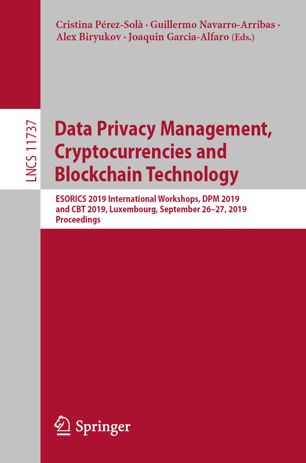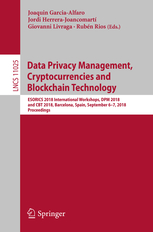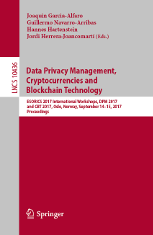LNCS proceedings & Program
Online access to LNCS 11737 is already available at SpringerLink.
The final program is already available.
Aims and Scope
Since the appearance of Bitcoin in 2009, a plethora of new cryptocurrencies and other blockchain based systems have been deployed with different success. While some of them are slightly different copies of Bitcoin, other ones propose interesting improvements or new usages of the underlying blockchain technology. However, the novelty of such technologies is often tied with rapid developments and proof-of-concept software, and rigorous scientific analyses of the proposed systems are often skipped.
This workshop aims to provide a forum for researchers in this area to carefully analyze current systems and propose new ones in order to create a scientific background for a solid development of new cryptocurrencies and blockchain technology systems.
Topics
The main topics include (but are not limited to):
- Anonymity and privacy in cryptocurrencies.
- Privacy-preserving technologies.
- Cryptocurrency based trust systems.
- Security analysis of existing cryptocurrencies.
- Formal threat models in cryptocurrency systems.
- Improvement proposals for existing cryptocurrencies.
- P2P network cryptocurrencies analysis.
- Private transactions in blockchain based systems.
- Consensus mechanisms: proof-of-work, proof of stake, proof of burn, proof-of-useful-work.
- New usages of the blockchain technology.
- Scalability solutions for blockchain systems.
- Smart contracts.
Program Commitee
PC Chairs:
Alex Biryukov, University of Luxembourg, Luxembourg
Email: alex.biryukov [at] uni [dot] lu
Joaquin Garcia-Alfaro, Télécom SudParis, France
Email: joaquin.garcia_alfaro [at] telecom-sudparis [dot] eu
PC Members:
Daniel Augot - INRIA Saclay (France)
Jean-Philippe Aumasson - Kudelski (Switzerland)
George Bissias - University of Massachusetts at Amherst (USA)
Joseph Bonneau - NYU (USA)
Rainer Böhme - Universität Innsbruck (Austria)
Christian Decker - Blockstream (Switzerland)
Sergi Delgado-Segura - UCL (UK)
Arthur Gervais - Imperial College London (UK)
Hannes Hartenstein - KIT (Germany)
Jordi Herrera-Joancomarti - UAB (Catalonia)
Man Ho Au - The Hong Kong Polytechnic University (Hong Kong)
Ghassan Karame - NEC Research (Germany)
Aniket Kate - Purdue University (USA)
Eleftherios Kokoris-Kogias - EPFL (Switzerland)
Patrick McCorry - UCL (UK)
Zaki Manian - Trusted IoT Alliance (USA)
Shin'ichiro Matsuo - Georgetown University (USA)
Pedro Moreno-Sanchez - TU Wien (Autria)
Guillermo Navarro-Arribas - UAB (Catalonia)
Cristina Pérez-Solà - UOC (Catalonia)
Bart Preneel - Katholieke Universiteit Leuven (Belgium)
Tim Ruffing - Blockstream (Switzerland)
Fatemeh Shirazi - Web3 Foundation (Switzerland)
Ewa Syta - Trinity College (USA)
Khalifa Toumi - SystemX (France)
Edgar Weippl - SBA Research (Austria)
Keynotes
We are pleased to announce that Arthur Gervais, Joseph Bonneau, and Rainer Böhme will be our keynote speakers.
Speaker: Arthur Gervais, Imperial College London, UK.
Title: Off Blockchain Protocols
Date: Thursday, September 26
Abstract:
A plethora of recent research works have demonstrated different mechanisms on how to perform blockchain transactions without writing every single interaction to the underlying ledger. Instead, these protocols utilize the expensive and low-rate blockchain only as a recourse for disputes. Off-chain protocols promise to complete transactions in sub-seconds rather than minutes or hours while retaining asset security, reducing fees and allowing blockchains to scale. This talk will explore the various lines of research covering off-chain transactions. We will discuss their security and privacy provisions and identify unsolved challenges, indicating promising avenues of future work.
Short Biography:
Dr. Gervais is lecturer at Imperial College London (UK). He is
Co-Founder, CEO, of Blockchain
Scalability Platform. His research focuses on the security,
privacy and performance of blockchain technology. Because this
technology is still in its infancy, he largely focus on understanding
and quantifying the tension points and tradeoffs in terms of security,
privacy and performance, with the goal to build a mainstream,
scalable, open, and decentralized blockchain protocol. Part of his
research is e.g., the design of usable software that securely
interacts with networks and hardware, connecting the real world with
blockchain, and the design of practical and scalable blockchain
platform. His research is inherently multidisciplinary and he
frequently collaborate with colleagues worldwide in various fields
(e.g., machine learning).
Speaker: Joseph Bonneau, New York University, USA.
Title: Compact Blockchains & Proofs-of-Necessary Work
Date: Thursday, September 26
Abstract:
Incrementally verifiable computation can produce a short proof that an entire blockchain history is correct. This enables even light clients to track the blockchain efficiently with minimal trust assumptions. The main challenge is to incentivize creating these proofs. This talk will overview the challenges and possible solutions for solving this incentive problem in a proof-of-work setting by having proof creation double as a proof-of-work puzzle.
Short Biography:
Joseph holds a Bachelor of Science and Master of Science from Stanford University. In 2012 he received a Doctor of Philosophy in Computer science from University of Cambridge. He started his career in 2007 as a Cryptographic Scientist at Cryptography Research, Inc. From 2012 to 2014 he worked as a Software Engineer at Google. From 2015 to 2017 he was an Electronic Frontier Foundation at Electronic Frontier Foundation. Since 2017 Joseph has been an Assistant professor at New York University.
Speaker: Rainer Böhme, University of Innsbruck, Austria.
Title: Finality from Proof-of-Work Quorums
Date: Friday, September 27
Abstract:
We challenge the widely held belief that proof-of-work enables truly permissionless decentralized systems, but the price to pay is that state updates are never final.
We propose HotPoW, a scalable permissionless distributed log protocol, as a positive example to support our claim that it is possible to build permissionless consensus protocols *with* finality based on proof-of-work. HotPoW adapts the three-phase commit pipeline recently presented in HotStuff (PODC 2019; used in LibraBFT) by relying on the stochastic uniqueness of proof-of-work quorums, a new theoretical concept for protocol design. We position HotPoW in the design space of consensus protocols and evaluate it with nodes that implement adversarial modifications. The protocol can tolerate network latency, churn, and targeted attacks on consistency and liveness at small overhead compared to Nakamoto consensus. We invite the community to prove our claim wrong, and provide running code to facilitate this task. (Joint work with Patrik Keller)
Short Biography:
Rainer Böhme is professor of Computer Science at the University
of Innsbruck and head of the Security and Privacy Laboratory. He is
a pioneer of interdisciplinary cryptocurrency research and co-founder
of one of the leading academic venues in Bitcoin and blockchain research.
He served as spokesperson of the German BITCRIME research project (2014-2017)
and is principal investigator in the European Commission's Horizon 2020
project TITANIUM (2017-2020) as well as in the VIRTCRIME research
project (2018-2019) funded by the Austrian government.
CBT'19 Program
September 26
08:00 - 08:45 Registration
08:45 - 09:00 General Welcome
(Room: Schengen II. Chairs: Alex Biryukov & Joaquin Garcia-Alfaro)09:00 - 10:00 Invited Talk I
(Room: Schengen II)-
Off Blockchain Protocols
By Arthur Gervais, Imperial College London, UK.
Abstract: A plethora of recent research works have demonstrated different mechanisms on how to perform blockchain transactions without writing every single interaction to the underlying ledger. Instead, these protocols utilize the expensive and low-rate blockchain only as a recourse for disputes. Off-chain protocols promise to complete transactions in sub-seconds rather than minutes or hours while retaining asset security, reducing fees and allowing blockchains to scale. This talk will explore the various lines of research covering off-chain transactions. We will discuss their security and privacy provisions and identify unsolved challenges, indicating promising avenues of future work.
10:00 - 10:30 Coffee Break
10:30 - 12:00 Session 1: Lightning Networks and Short Papers
(Room: Schengen II. Chair: Rainer Böhme)-
TEE-Based Distributed Watchtowers for Fraud Protection in the Lightning
Network.
By Marc Leinweber, Matthias Grundmann, Leonard Schönborn and Hannes Hartenstein. -
Payment Networks as Creation Games.
By Georgia Avarikioti, Rolf Scheuner and Roger Wattenhofer. - Short Papers
- An Efficient Micropayment Channel on Ethereum, By Hisham Galal, Muhammad Elsheikh and Amr Youssef.
- Extending Atomic Cross-Chain Swaps, By Jean Yves Zie, Jérémy Briffaut, Benjamin Nguyen and Jean-Christophe Deneuville.
12:00 - 13:30 Lunch Break
13:30 - 14:45 Session 2: Smart Contracts and Applications
(Room: Schengen II. Chair: Hannes Hartenstein)-
The Operational Cost of Ethereum Airdrops.
By Michael Fröwis and Rainer Böhme. -
Blockchain Driven Platform for Energy Distribution in a Microgrid.
By Arjun Choudhry, Ikechukwu Dimobi and Zachary Gould. -
Practical Mutation Testing for Smart Contracts.
By Joran Honig, Maarten Everts and Marieke Huisman.
14:45 - 15:15 Coffee Break
15:15-16:45 Session 3: Payment Systems & Invited Talk II
(Room: Schengen II. Chair: Joaquin Garcia-Alfaro)-
Online Payment Network Design.
By Georgia Avarikioti, Kenan Besic, Yuyi Wang and Roger Wattenhofer. -
Invited Talk II
-
Compact Blockchains & Proofs-of-Necessary Work
By Joseph Bonneau, New York University, USA.
Abstract: Incrementally verifiable computation can produce a short proof that an entire blockchain history is correct. This enables even light clients to track the blockchain efficiently with minimal trust assumptions. The main challenge is to incentivize creating these proofs. This talk will overview the challenges and possible solutions for solving this incentive problem in a proof-of-work setting by having proof creation double as a proof-of-work puzzle.
-
Compact Blockchains & Proofs-of-Necessary Work
17:00 Social Activity
20:30 Gala Dinner
September 27
09:00 - 10:00 Invited Talk III
(Room: Schengen II. Chair: Alex Biryukov)-
Finality from Proof-of-Work Quorums
By Rainer Böhme, University of Innsbruck, Austria.
Abstract: We challenge the widely held belief that proof-of-work enables truly permissionless decentralized systems, but the price to pay is that state updates are never final. We propose HotPoW, a scalable permissionless distributed log protocol, as a positive example to support our claim that it is possible to build permissionless consensus protocols *with* finality based on proof-of-work. HotPoW adapts the three-phase commit pipeline recently presented in HotStuff (PODC 2019; used in LibraBFT) by relying on the stochastic uniqueness of proof-of-work quorums, a new theoretical concept for protocol design. We position HotPoW in the design space of consensus protocols and evaluate it with nodes that implement adversarial modifications. The protocol can tolerate network latency, churn, and targeted attacks on consistency and liveness at small overhead compared to Nakamoto consensus. We invite the community to prove our claim wrong, and provide running code to facilitate this task. (Joint work with Patrik Keller)
10:00 - 10:30 Coffee Break
10:30 - 13:00 Session 4: Privacy, Mining and Short papers
(Room: Schengen II. Chair: Guillermo Navarro)- Simulation Extractability in Groth's zk-SNARK, By Shahla Atapoor and Karim Baghery.
- Auditable Credential Anonymity Revocation Based on Privacy-Preserving Smart Contracts, By Rujia Li, David Galindo and Qi Wang.
- Bonded Mining: Difficulty Adjustment by Miner Commitment, By George Bissias, David Thibodeau and Brian Levine.
- A Multi-Protocol Payment System to Facilitate Financial Inclusion, By Kazim Rifat Özyilmaz, Nazmi Berhan Kongel, Ali Erhat Nalbant and Ahmet Özcan.
- Short Papers
- 12 Angry Miners, By Aryaz Eghbali and Roger Wattenhofer.
- A minimal core calculus for Solidity contracts, By Massimo Bartoletti, Letterio Galletta and Maurizio Murgia.
- Multi-Stage Contracts in the UTXO Model, By Alexander Chepurnoy and Amitabh Saxena
13:00 - 14:00 Farewell Lunch
Venue
The workshop will be held in Luxembourg, in conjunction with the 24th annual
European research event in Computer Security (ESORICS 2019) symposium.
More information about the venue is available on the ESORICS 2019 website
at https://esorics2019.uni.lu/location/
Travel and accommodation information is also available from the ESORICS 2019 website
at the accommodation and
travel menu entries.
Registration
To register to CBT 2019, please follow the general registration instructions
for ESORICS 2019 (kindly specify CBT when registering to the registration service).
Kindly follow this link to register.
Call for papers
Regular and short papers: Papers must be original and not submitted for publication elsewhere. Authors are invited to submit their manuscripts following the LNCS Proceedings Manuscript style. Papers are limited to 16 pages (full papers), or 8 pages (short papers) including references and appendices. Paper must be submitted in PDF format, using the CBT 2019 submission entry at easychair.
Double blind review: CBT requires anonymized submissions — please make sure that submitted papers contain no author names or obvious self-references.
Accepted conference papers will be published by Springer in the LNCS collection. At least one author of each accepted paper is required to cover a full registration and present their work at the workshop; otherwise the paper will not be included in the proceedings.








